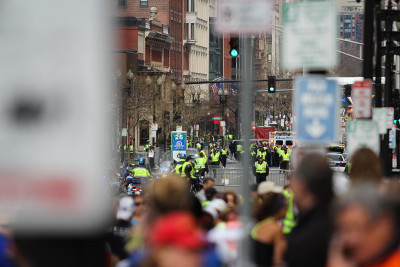
Looking to provide vocational rehabilitation services to victims of the 2013 Boston Marathon bombings, the Institute for Community Inclusion at the University of Massachusetts Boston will make use of a $315,000 grant from the Massachusetts Office for Victim Assistance.
Among the services planned is the Employment Options Program, a free service that will assist victims with career guidance and provide community resources for victims looking to re-enter the workforce, according to a Dec. 2 press release.
Carolyn Hall, a training associate at the ICI, said the organization provides specific and unique care to meet the needs of victims with various issues.
“So many people were impacted in a variety of ways that for many, many reasons pulled them out of the job market,” she said. “[And] now we’re really seeking to help people who were impacted return to work and have all the resources available to them to do so.”
The long-term benefits of the grant will include helping victims with a variety of educational backgrounds, Hall said.
“There will be some people that might have had a lot of education, they might have a master’s degree,” she said. “There are other people that might have done construction work or been a plumber. All [of] their situations are very different.”
Christopher Klaskin, director of public affairs at MOVA, said the office provided its Anti-Terrorism Emergency Assistance Program Grant specifically to ICI because of the institute’s experience with vocational training and employment services in Boston.
“Vocational rehab was really kind of a need for [marathon victims] in terms of when they were ready to get back into the workforce, to have that available for them,” he said. “[And] also for a lot of their family members, many of whom that needed to take time off or to leave from work to become caregivers.”
Kraskin added that because the ICI has been participating in this work for more than 30 years, it is able to provide significant help with trauma. Programming for the grant was modeled after prior AEAP grants in which vocational rehabilitation was prioritized, he said.
The grant will help the ICI to handle the “wide spectrum of survivors” with issues ranging from lost limbs to emotional and behavioral impairment, Kraskin said.
“We are hopeful that [the grant] is going to reach a pretty wide audience of folks that could use it,” he said.
Hall said the ICI is looking forward to working with MOVA, as well as promoting success and recovery for marathon victims.
“We’re very excited to have the opportunity to work with the Marathon survivors,” she said. “MOVA has definitely dedicated some resources to that, knowing that there is a strong need to help people return to employment.”
Several residents said the grant will be beneficial for victims’ physical and mental health.
Judy Michel, 21, of Roslindale, said the help for marathon victims should always be provided by organizations and citizens across the country.
“What happened to them was horrible, they really suffered,” she said. “Why not give them the help they need?”
Steve Sisto, 22, of Allston, said the work being done can help to ease the difficult road ahead for victims.
“This grant is a perfect example of the good that still exists in humanity,” he said. “It’s great that the city of Boston is ensuring that these people don’t have to go at it alone.”
Aslan Ahmet, 25, of Beacon Hill, said he is happy to see that help is continuously being provided to victims of the marathon.
“It’s a great thing for the victims because its gives them more than just money,” he said. “They need people to talk to about how they get make their life better after what happened.”












































































































